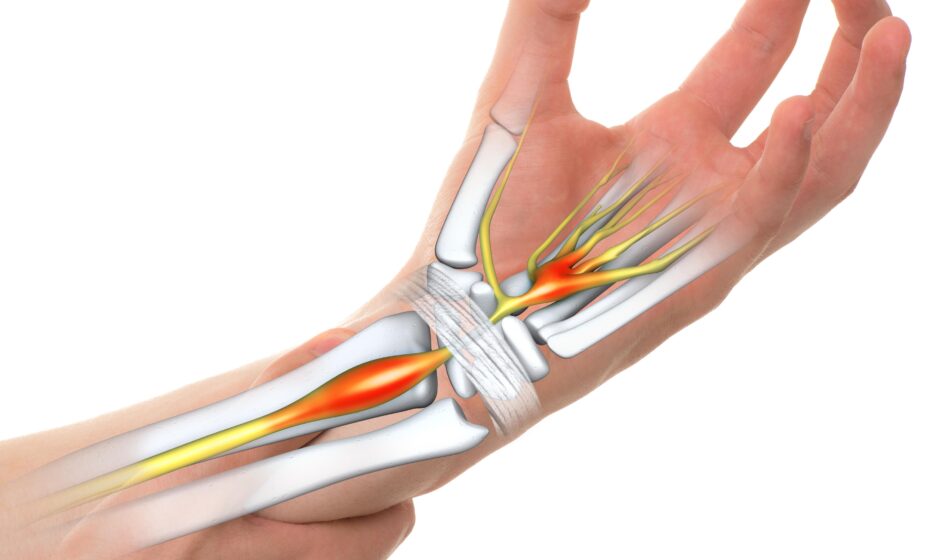Carpal Tunnel Syndrome (CTS) is a common condition that causes pain, numbness, and tingling in the hand and arm. It occurs when the median nerve, which runs from the forearm to the palm, becomes compressed or irritated at the wrist. While there are various treatment options available for CTS, nerve block treatment has emerged as a highly effective and non-invasive solution for managing pain and discomfort. At the Neurology and Pain Management Clinic (NPMC), Dr. Gautam Arora and his expert team offer advanced nerve block treatments tailored to provide relief from Carpal Tunnel Syndrome. Here’s what you need to know about this treatment option.
What is Carpal Tunnel Syndrome?
Carpal Tunnel Syndrome is a condition that arises when the median nerve in the wrist becomes compressed. The carpal tunnel is a narrow passageway in the wrist that houses tendons and the median nerve. When the tendons become swollen or inflamed due to repetitive motions, injury, or other causes, they can put pressure on the median nerve, leading to symptoms such as:
- Pain in the wrist or hand
- Numbness or tingling in the fingers, especially at night
- Weakness in the hand, making it difficult to grip objects
CTS is common in individuals who perform repetitive tasks, such as typing, assembly work, or using vibrating hand tools.
What is Nerve Block Treatment?
A nerve block is a minimally invasive procedure that involves injecting medication around a specific nerve or group of nerves to interrupt pain signals. For Carpal Tunnel Syndrome, a nerve block can be used to target the median nerve in the wrist, providing significant relief from the pain and discomfort caused by CTS.
How Does a Nerve Block Work?
The process of administering a nerve block for Carpal Tunnel Syndrome typically involves:
- Preparation: A local anaesthetic is applied to the skin around the wrist to minimize discomfort during the procedure.
- Injection: A needle is carefully inserted near the median nerve, and a combination of anaesthetic and corticosteroid medication is injected. The anaesthetic temporarily numbs the nerve, while the corticosteroid helps reduce inflammation and swelling.
- Relief: The nerve block provides immediate relief by disrupting pain signals and reducing inflammation in the carpal tunnel, allowing for better nerve function and reduced symptoms.
Benefits of Nerve Block Treatment for Carpal Tunnel Syndrome
Nerve block treatment offers several advantages in managing Carpal Tunnel Syndrome, including:
1. Pain Relief
The primary benefit of nerve block treatment is pain relief. By numbing the affected nerve, the treatment provides significant reduction in pain, allowing you to resume normal activities with less discomfort.
2. Reduced Inflammation
The corticosteroids used in nerve block injections help to reduce inflammation around the median nerve, which is often a key factor contributing to CTS.
3. Non-Surgical Solution
Nerve blocks are a non-invasive, non-surgical option for people with CTS who prefer to avoid more invasive treatments like surgery. It offers a safe alternative for those who may not be candidates for surgery due to medical reasons.
4. Minimal Recovery Time
Unlike surgery, nerve block injections involve minimal recovery time. Most patients can resume daily activities shortly after the procedure, though rest is recommended for optimal results.
5. Quick and Effective
Nerve block treatment is typically performed in an outpatient setting and can provide quick and lasting relief from CTS symptoms. Many patients experience improvement within a few days after the injection.
Who is a Candidate for Nerve Block Treatment?
Nerve block injections are typically recommended for individuals with Carpal Tunnel Syndrome who experience:
- Moderate to severe pain that does not respond well to conservative treatments like over-the-counter pain medications or physical therapy.
- Symptoms that interfere with daily activities, such as typing, gripping objects, or performing other routine tasks.
- Chronic CTS that has not improved with rest or other interventions.
It is important to consult with a healthcare provider, such as Dr. Gautam Arora at NPMC, to determine if a nerve block is the right treatment option for your condition.
Other Treatment Options for Carpal Tunnel Syndrome
While nerve blocks can be highly effective, they are often part of a comprehensive treatment plan for Carpal Tunnel Syndrome. Other treatment options may include:
- Wrist Splints: Wearing splints, especially at night, can help keep the wrist in a neutral position and reduce pressure on the median nerve.
- Physical Therapy: Specific exercises can help strengthen the wrist and reduce pressure on the carpal tunnel.
- Non-Steroidal Anti-Inflammatory Drugs (NSAIDs): Over-the-counter pain relievers like ibuprofen can help reduce inflammation and provide temporary pain relief.
- Surgery: In severe cases of CTS that do not respond to conservative treatments, surgery (known as carpal tunnel release) may be recommended to relieve pressure on the median nerve.
What to Expect After Nerve Block Treatment
After receiving a nerve block injection for Carpal Tunnel Syndrome, most patients experience some temporary numbness and may feel some relief from pain almost immediately. However, the full effects of the corticosteroid medication may take a few days to manifest.
You may also be advised to:
- Avoid strenuous activities for a short period after the procedure to ensure optimal healing.
- Follow up with your healthcare provider for additional treatments or assessments to track your progress.
Conclusion
Nerve block treatment is a highly effective and non-invasive solution for managing the symptoms of Carpal Tunnel Syndrome. If you’re struggling with pain, numbness, and tingling in your hands or wrists, a nerve block injection could provide significant relief. At the Neurology and Pain Management Clinic (NPMC), Dr. Gautam Arora and his team offer expert care and personalized treatment options tailored to your specific needs. Schedule a consultation today to learn more about how nerve block treatments can help you find lasting relief from Carpal Tunnel Syndrome.



